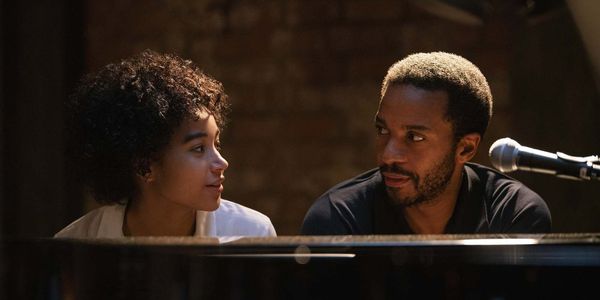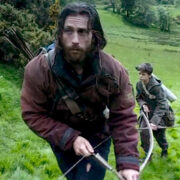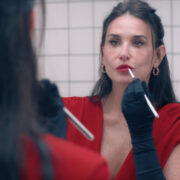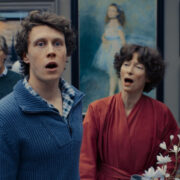THE EDDY Miniseries: Great Performances & Music Make For Simmering Drama

Andrew Young is a freelance writer on film and culture…
Everyone keeps talking about The Eddy as ‘Damien Chazelle’s new show’. In truth, Chazelle serves only as an executive producer and director of the first two episodes of this eight-part Netflix miniseries. It could equally be described as the work of series creator Jack Thorne, who has, in the UK at least, been quickly becoming one of the most acclaimed TV writers around. Following Brit dramas like National Treasure and Kiri, Thorne was given the keys to the BBC/HBO adaptation of His Dark Materials last year, and then accompanied this with universally-acclaimed Shane Meadows collaboration The Virtues.
Thorne has now taken another left-turn in subject matter, then, with this intense drama throbbing with music and stand-out performances. Telling the story of the eponymous Parisian jazz club and its band members, The Eddy is a frequently intense and gripping drama from scene one. Somewhere near the start of the show a classic ‘big, shocking event that shouldn’t be spoiled’ happens, and the fuse is lit for arguments, reparations, and some run-ins with the law. Throughout this limited run, The Eddy is a stylistic and emotional success, delivering dramatic weight and compelling characters. Any shots at true greatness, however, are hampered by some persistent narrative frailties.
Piece by Piece
The Eddy is set in Paris, but the club itself is a real melting pot of musicians from all over the globe. The dialogue frequently switches between English and French, with bits of Spanish, Polish, Arabic and Croatian thrown in there too. The experience of the show’s non-French characters flip-flopping between French and their native tongue may take a little getting used to but, unlike a lot of American-made and foreign-set productions, it is realistic and adds authenticity to proceedings.
Each episode is named after and principally follows one of the club’s arrays of musicians and appendages. The narrative focus, therefore, shifts around throughout the series, continually giving the audience something fresh and allowing for binge-watching without boredom ever setting in. Episode One is all about Elliot (André Holland), who remains the central protagonist throughout.

We’ve seen Elliot before on screen: a divorced, down-on-his-luck former star with familial troubles and a broken heart. He’s rude and unkind to others sometimes, but we sense that he is a good person. He never seems entirely happy, but he is most comfortable when at The Eddy, which he owns and runs with Tahar Rahim’s Farid. Elliot is a famously brilliant pianist, but no longer plays, perhaps as a result of his ongoing grief over the death of his son several years earlier.
Elliot could have easily become quite a drab lead for the series, performing the same function as so many of TV’s tortured souls. Yet it is so difficult not to connect with him and invest in the story when Holland is giving such an excellent performance. Weary, shambolic, yet effortlessly cool, Holland embodies the role perfectly and brings an understated emotional current to it.
Throughout The Eddy, Elliot is a man under pressure, shakily moving from one task to the next with trouble not far behind. In one scene, he knocks over a mop bucket whilst literally trying to clean up the mess in his life. He doesn’t get angry and kick the bucket like people usually do in these scenes, however. He just sighs deeply, shakes a little and nears the precipice of a breakdown, before just about holding it together. It’s a masterclass from Holland and the kind of below-the-surface emotion that gives the whole series its energy.
In Elliot’s daughter Julie (Amandla Stenberg), who has moved to Paris from New York having fallen out with her mother, we have a similar situation. As she becomes the focal point of episode two, we are braced for another common archetype – this time ‘troubled teen gone wild’. 16-year-old Julie causes trouble wherever she goes, and just flat out refuses to go to school most of the time. The role is elevated, though, by Stenberg. The young star pushes our sympathy for the character to the limit, threatening to make her antics wholly deplorable but always grounding them in hurt. In her headline episode, Stenberg is a damn force of nature.
In another segment, we spend time with singer Maja, a kind, loving woman who has become used to being alone. We suspect there’s some romantic past between her and Elliot, but it’s never made that clear. Joanna Kulig brings another great performance to the table as Maja and a fantastic singing voice with it. Drummer Katarina (Lada Obradovic), burdened with financial troubles and a severely ill father, is a peripheral character for most of the series who ultimately becomes crucial when the spotlight is finally shone on her. The band member episodes are rounded out by bassist Jude (Damian Nueva), a surly ex-heroin addict who hangs on to his music for solace in life.

Outside of the club, there’s also an episode each for the club’s barman Sim (Adil Dehbi), and Farid’s wife Amira (Leïla Bekhti). The former provides the sweeter, warmer side to the show’s emotional centre. A good kid who loves his grandmother, Sim has a romantic plotline with Julie, which adds some optimism in a generally quite gloomy show. Amira, meanwhile, is a strong, multi-faceted character who acts as a maternal figure for Julie, whilst also dealing with marital pressures, her own kids, and a strained relationship with her ne’er-do-well brother. Between them, and a few smaller roles, these characters make up The Eddy.
The Bigger Picture
You may have noticed that only seven characters have an episode devoted to them in this eight-part work. That’s because the last instalment is simply titled ‘The Eddy’. It makes sense for the show thematically, as what Thorne’s story is really about is the club itself, and the crucial role it plays in the lives of those around it.
For many of our characters, The Eddy is both a place and a group of people on which they depend, not financially – it’s unclear whether they’re really making any money for their work – but emotionally. The show brings together a group of an otherwise very troubled, often lonely bunch of people. For Elliot in particular, so hurt and so irrevocably changed by his past, the club is something he understands and can fight for.
The majority of the show involves him trying desperately to keep The Eddy afloat in the face of increasing financial and legal pressures. That Elliot at times ignores his daughter, lies to the police, and takes stupid personal risks, is something we inherently understand and perhaps even support him for, because, piece by piece, the show reveals to us the necessity of the club in the lives of its musicians. Everyone’s relationship to The Eddy is different, though, avoiding dull repetition of the central point.

Thematically, the club itself is crucial to the show’s success, and it proves to be equally important stylistically. The story is not nominally ‘about jazz’ but without its music, The Eddy would have far less life in its drama. Despite his direct involvement being lesser than the marketing and discussion of the show may suggest, Damien Chazelle’s prints are all over The Eddy. Directing the first two episodes, he establishes a tone and visual style that is then continued all the way through with good work by Houda Benyamina, Laïla Marrakchi, and Alan Poul.
Dark, gritty, and naturalistic, The Eddy is a far cry from La La Land, but the extended music sequences have all the hallmarks of the man who made Whiplash. Like in that film, the jazz scenes are seductively gripping, drawing in an audience and creating a love of the genre that may not have been there beforehand. Quick-cutting close-ups and a focus on the musicians themselves help to emphasise the live, performative element of the music, and the real skill that goes into it.
The original songs, written by Randy Kerber (who also plays the band’s pianist) and Glen Ballard, emphasise the skill and spirit of jazz whilst always remaining accessible. Combined with clever choreography of their performances, they add a real vitality to the show. Outside of the musical sequences, The Eddy’s visual style melds shaky cameras with low-key settings and a great use of natural light. As with the emotions of its characters, the looks and sounds of The Eddy hold a crackling yet controlled fire within them.
Short of Greatness
For all its bubbling emotion and captivating jazz sequences, The Eddy only ever threatens to be a great drama. It’s an impressive work, for sure, but there are issues in the storytelling that prevent it from making the leap to top-tier TV. Beyond the deep, human problems it tackles, The Eddy is also driven by a series of unanswered questions. Many details of the characters’ backstories are hidden from us, and the story’s central tragedy brings with it an ongoing mystery.
It is still constructed like a drama, not a whodunnit, and this actually works very well. The mystery elements feel real and disorientating, keeping us constantly compelled, hooked into watching another episode to work out quite what’s going on. The problem is that the unravelling of these secrets is at once both simple and confusing. The story is hardly labyrinthine and shocking, but the low-key plot is told in quite a muddled way. Come the end, the whole thing feels a bit unsatisfying, like you have been waiting for the whole series for either a twist or some clarity and neither ever really coming.
That we are constantly gripped by the more thriller-like elements of the series demonstrates that they are by no means a failure, but their telling could have been a bit sharper. A perhaps more glaring narrative error comes in that ‘piece by piece’ structure. It succeeds in adding depth to the ensemble, and in emphasising the importance of the club, but often the individual plotlines are too one-note to justify the deviation from the central, more interesting storyline.
The familial troubles and backstories of the individuals often do not progress beyond an archetypal sad situation. Maja has a strained relationship with her mother, Amira likewise with her brother, Katarina looks after her formerly abusive father, and Jude struggles to get fully sober. All of these are good jumping-off points for a more developed story but, because they are all tangents and the show needs to get back to the more Elliot-centric plot, that development never comes. The drama is therefore always engaging and well-acted, but feels inefficient in the show as a whole, taking half an episode to give us character depth we could have had in 5 minutes. We are then left with a sprawling sketch that is always handsomely drawn but is only sometimes filled in with colour and vivid detail. At its best, The Eddy blends its individual character arcs with the central storyline, enhancing everyone’s character depth in the process, but this doesn’t happen often enough.
Come the end, The Eddy feels like a compelling, well-made eight-hour drama, that could have been just as good in seven hours.
What did you think of The Eddy? Did you like the ‘piece by piece’ structure? Let us know in the comments!
Watch The Eddy
Does content like this matter to you?
Become a Member and support film journalism. Unlock access to all of Film Inquiry`s great articles. Join a community of like-minded readers who are passionate about cinema - get access to our private members Network, give back to independent filmmakers, and more.
Andrew Young is a freelance writer on film and culture from Manchester, UK. If you like his writing, Andrew also runs a more informal film website at reeltime.blog












